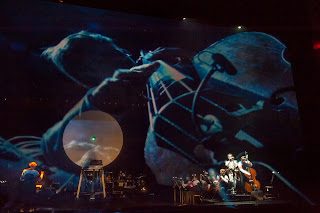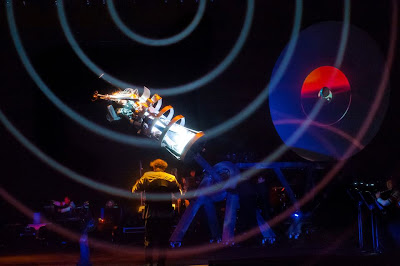 |
| photo courtesy of Lincoln Center Festival Facebook |
Elizabeth – We had tickets to Toshio Hosokawa’s one act opera Matsukaze this past weekend, but when offered the chance to see the American premiere of Karlheinz Stockhausen’s Michaels Reise um die Erde (Michael’s Journey Around the Earth) we jumped at the chance. Admittedly, I don’t know much about Stockhausen, but throw the word “premiere” before anything and I’m in.
I have never attended an opera at Avery Fisher and knew this would be something different. Inside the hall, a scrim glowing cobalt blue stood between the audience and the on stage orchestra and some large machinery. At first I found the artificial distance created between orchestra and audience off putting, but the images later projected onto the scrim generated a diorama effect that was visually quite fun.

photo courtesy of Lincoln Center Festival Facebook
The music was modern and while there weren’t any vocals, except for a few German words called out, there was a clear conversation between Eve and Michael, Michael and the orchestra, and Michael telling his story to the audience. What Michael and Eve were talking about and what Michael was saying, I have no idea, but oddly it felt organic—a man in a trumpet “speaking” to the orchestra next to him onstage while a giant machine rotated and a wheel in the background sometimes acted as map and other times reflected a collection of skulls. As we traveled around the world (many of the “acts” were coming from specific locations on earth) and then left earth I found my mind wandering in a pleasant way, not out of boredom as I did during some operas last year. The music and the effects that Ensemble musikFabrik created were evocative and creative. I particularly loved the plumes of wavy lines projected onto the screen; sound waves emanating from Michael’s trumpet became visual waves once they hit the scrim.

photo courtesy of Lincoln Center Festival Facebook

photo courtesy of Lincoln Center Festival Facebook
There were times, though, that I got the distinct feeling that Michael’s Journey was written in the late 70s or early 80s. The sun rising across the scrim and the thick rings projected onto the screen gave off a very “2001: A Space Odyssey” vibe. That took me out of the opera itself. I looked around the audience and imagined myself transported back to the 80s and seeing this piece as experimental and edgy as it would have been then. Today I found it great in that it was a twist on traditional opera: the scrim; the disc behind Michael being the earth, the moon, a single light source; and Michael himself as a trumpet player instead of a singer AND being an astronaut harnessed into equipment that had him fly around the stage. YET, there was an element of trying too hard to do something new with this piece, at points it was gimmicky to me. That isn’t to say that it isn’t different and great, but there was a sense that had this actually been produced in the 70s it would have totally blown people’s minds. I say this only in part because of the 70s vibe, but also because there wasn’t a clear enough narrative for me. I may be too traditional or perhaps simply have not seen enough modern opera, but I found myself at times trying to piece together some sort of story that wasn’t easily within my grasp. Perhaps if I had been watching it on LSD in 1977 my mind would have been blown.
The full cycle of Stockhausen’s Licht: Die Sieben Tage der Woche (Light: The Seven Days of the Week) is meant to be performed in 7 parts, one each day of the week beginning with Thursday and totaling over 28 hours of music. It depicts the angel Michael’s leading of humanity to God and the relationship of three main characters: the angel Michael, Eve the embodiment of love and life, and Lucifer the fallen angel and ultimate adversary. Michaels Reise um die Erde is the second act of the Thursday installment of the cycle. It was written in 1977-80. Stockhausen died in 2007.

photo courtesy of Lincoln Center Festival Facebook
 |
| photo courtesy of Lincoln Center Festival Facebook |
I found Michaels Reise um die Erde absolutely riveting. The music and Carius Padrissa’s stage direction complemented each other beautifully. And although several of the key technical lighting cues seemed to be late, I was completely taken in by the effects and stagecraft. The interplay of the projections on the scrim and Michael soaring around the stage in his chrome Cherry Picker-Crane gave the illusion of depth, space, freedom of movement almost more than I have ever seen onstage anywhere. One of the last visuals of the show, Eve and Michael suspended together on the same lift platform playing a duet in a kind of colorful cosmic womb, has powerfully stuck with me since Saturday night.
Stockhausen’s music, which I was hearing for the first time, equally grabbed me so the show was not style over substance in any way. I was able to follow the separate musical themes and instruments for each character and their interplay, which forms the narrative, quite easily. I often felt as if I was floating in a trance being gently tugged along by the music and visuals.
 |
| photo courtesy of Lincoln Center Festival Facebook |
Marco Blaauw, the virtuoso trumpeter who played Michael, was amazing both for his instrumental skills and his acting. Even conveying emotion and character while NOT playing and being twirled around in air above the orchestra. He was never upstaged by the flashy stagecraft employed. No small feat dramatically speaking. And as I said his playing was virtuosic.
 |
| photo courtesy of Lincoln Center Festival Facebook |
Technical and musical excellence aside, the secondary stars of the show were the crack team of black dressed stage hands moving all the set pieces by hand including Michael’s crane, conductor Peter Rundel’s podium and all the other set pieces. They were nearly always in view scampering around onstage but completely unobtrusive, silent and nearly invisible.
The orchestra consisted of the German Ensemble musikFabrik, of whom trumpeter Marco Blaauw is a permanent member. Ensemble musikFabrik lists their mission statement as “To create music that is not there yet.” They certainly did for me on Saturday night. Stockhausen is a perfect pairing for them.
 |
| photo courtesy of Lincoln Center Festival Facebook |
As the audience left the theatre, Stockhausen’s “Donnerstags-Abscheid,” a musical farewell, was played in the Avery Fisher second floor lobby by five trumpeters spaced out on the balconies above. It was lovely.
–Elizabeth Frayer and Shawn E Milnes
The Gospel According to Dudamel, Adams and Sellars: The Gospel According to the Other Mary at Avery Fisher Hall
Discordant Fellatio: Powder Her Face (NYCO at BAM)
A Catholic Schoolgirl’s Musings on Parsifal at the Metropolitan Opera


Just wondering, is the insertion of that last sentence an attempted Stockhausianism?
Excellent review. Envious.